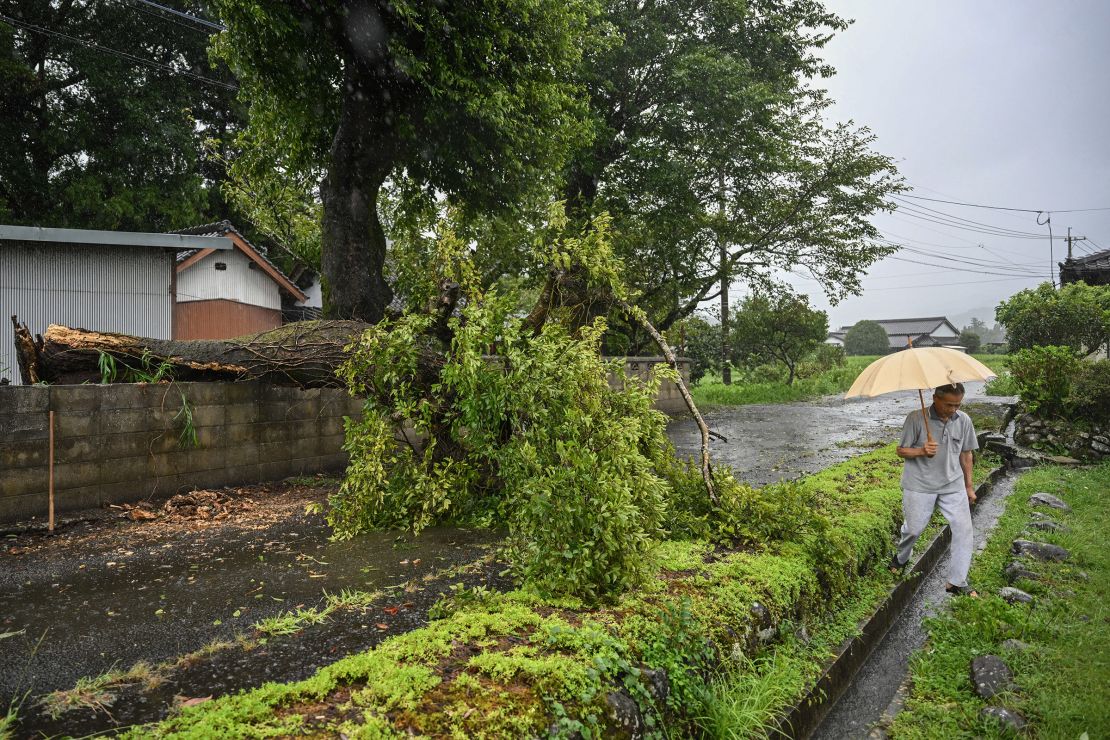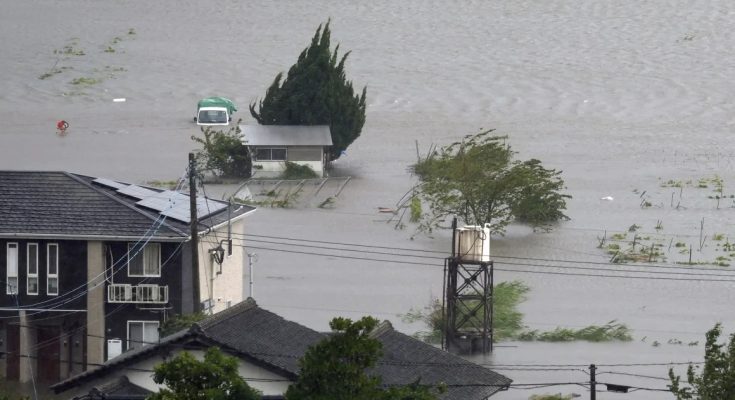Almost 4 million people in southern Japan have been urged to evacuate as Typhoon Shanshan made landfall Thursday, leaving thousands of residents without power and lashing Kyushu island with hurricane-force winds, torrential rain and dangerous storm surges.
The Japan Meteorological Agency issued a rare emergency warning for the slow-moving storm, saying it was expected to bring damaging flooding and landslides to most of Kyushu, the country’s southernmost main island, with record rainfall expected.
Hundreds of flights have been canceled, bullet train services suspended and major companies like automaker Toyota have closed factories.
Japanese authorities on Thursday warned that a “life-threatening situation” was imminent for towns in Kyushu’s Oita prefecture and urged 57,000 people to take “live-saving actions” as it issued its highest typhoon alert. A Level 4 evacuation advisory, the second-highest alert, is in place for all of Kyushu, affecting 3.7 million residents.
At least one person is missing and dozens of people have been injured across the island as of Thursday morning, according to local government offices. Earlier this week, three people were killed in a landslide triggered by Shanshan’s destructive wind and rains.
Typhoon Shanshan has weakened as it slowly moves north through Kyushu as the equivalent of a Category 1 Atlantic Hurricane, according to the Joint Typhoon Warning Center (JTWC). The center of the storm is about 150 kilometers (90 miles) southeast of the city of Sasebo, after hitting the mainland with windspeeds of up to 185 kph (115 mph).

Video from Miyazaki, close to where the storm made landfall, showed downed electricity pylons and roads strewn with tree branches and other debris.
Areas in Japan further away from the typhoon have also been affected by its bands of stationary heavy rains.
In central Aichi prefecture, a family of five were buried in a landslide when it destroyed their house late Tuesday, according to Gamagori City’s Crisis Management Division. Three people, a couple in their 70s and a 30-year-old man, died in the incident. Two women in their 40s were pulled out of the debris and survived, one with severe injuries.
Though Shanshan has weakened, it is moving slowly at 10 kph (7 mph) dumping huge amounts of rain onto the island. Slower storms can be more destructive, with strong gusts or rainstorms that pound the same areas for hours or days.
Already, rainfall has reached over 0.5 meters (20 inches) in many areas and forecasters say totals could reach as high as 1 meter (40 inches) across some isolated and hilly regions.
Japan’s Chief Cabinet Secretary Yoshimasa Hayashi said in a news conference Thursday that “record-breaking rainfall is expected” and authorities are trying to “assess the state of damage and implement emergency disaster response measures.”
The storm has forced more than 700 flights to be canceled and dozens of sections of the major highways running through Kyushu have closed, Hayashi said. Services on the Kyushu Shinkansen and Nishi Kyushu Shinkansen bullet trains have also been suspended.
“There are fears that the effects of the typhoon may spread further in the future,” Hayashi said.
More than 255,150 households on Kyushu were without power Thursday morning, according to Kyushu Electric Power.
Automakers Toyota, Honda, Mazda and Nissan are among major firms that have suspended some operations at their factories in the path of the storm.

Shanshan is expected to turn to the east and move through Kyushu, weakening to a tropical storm by the end of Thursday.
It will continue to move slowly over Japan’s southwest, before crossing into more central regions through the weekend and even into early next week, as a much weaker storm.
The main threat across the rest of Japan will continue to be widespread significant rainfall, with some areas in Shikoku and Honshu expected to see above 0.5 meters (20 inches).



